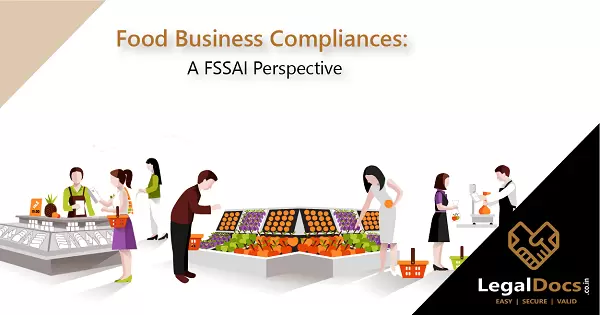Food Business Compliances
The food processing industry is one of the largest industries in India. It possesses huge potential for uplifting the agricultural economy. The food processing and manufacturing units that have been created have resulted in the generation of employment and export earnings. Various permits are required in order to start and run a food business. Realizing the necessity to regulate the manufacture, storage, distribution, sale, and import of food products, Government of India consolidated Food Safety and Standards Act (FSSA), 2006. The Act hereby establishes Food Safety and Standards Authority of India (FSSAI) to ensure the availability of safe and wholesome food for human consumption. This national regulatory body provides food regulatory compliance as per the international standards.
Food regulatory compliance in India categorizes food products as:
Standardized products: for which standards have been prescribed and no prior product approval is required.
Non-standardized food products: products which do not have safety parameters defined.
At present FSSAI has standardized 380 food articles in 16 categories. Those food articles that are non-standardized require product approval. It is important to note that traditional foods and their ingredients or additives require product approval. These product approvals are provided by FSSAI under the jurisdiction of various regulations that have been embedded.
The Food Safety and Standards Act (FSSA), 2006 has made it mandatory for all business operators to follow food business compliances. These include licenses and registrations in accordance with the Food Safety and Standards (Licensing and Registration of Food Business) Regulations, 2011. It further ensures safety, sanitary, and hygiene of food products offered by food business operators to the welfare of customers of the country. It is a compulsion for all food business operators to obtain a license from FSSAI, including entities right from post farming, manufacturing, selling, retailers, labeling, and more.
In consumption perspective, India is a very big market. Each state in India have their own laws governing the business, such as, health and trade licenses from the respective municipal corporations, environmental clearances from the state pollution control board. However, each and every food business operators in India must comply by Food safety and standards act. To this effect, the Act has confined the food safety and standards in India form a multi-level and multi-departmental control to a single line of command body having headquarters in New Delhi.
The preamble of FSSAI act also aims to provide food safety to the consumers. It has developed a checklist to ensure efficiency and transparency in food safety inspections. They have developed a list of compliances for general manufacturing, milk processing units, meat processing units, slaughterhouses, catering, retail, transport, and storage and warehouse units. These legal compliances are regarding the design and facilities provided in the unit, control of their operations, maintenance and sanitation, personal hygiene, training and complaint handling in these units.
Over the years, we have seen increased awareness regarding the quality of food and its safety. Whether the product is imported or homemade the Food safety and standards authority of India(FSSAI) is monitoring and surveying of food business operators under the provisions of Food Safety and Standards Act (FSSA), 2006. It is important to note here that since the administrative control of FSSA has been assigned to the FSSAI body, it thereby holds to be the single reference point authority. There have been 68 food testing laboratories accredited by FSSAI that have been established under FSSA, 2011 Regulations.
FSSAI License compliances also include Food Safety and Standards (Food Products Standards and Food Additives) Regulations, 2011. It provides quality compliance such as a sample of any food article has to be sent to the food analyst of a notified laboratory. The referral laboratory will conduct tests and investigate the food samples for the purpose of fixation of food standards for that food item. In order to maintain high standards of accuracy, reliability, credibility, high professional discipline is followed in the laboratories.
FSSAI compliances have been extended to provide quality food to avoid food adulteration, Contamination of food at any point in time, before it reaches the consumer is a major issue. For this purpose, food business compliances have been issued under Food Safety and Standards (Contaminants, Toxins, and Residues) Regulations, 2011.
Various aspects covered under this are:
Cross contamination: This includes any substance that has been added unintentionally to the food, as a result of environmental contamination. Cross contamination may occur at the time of manufacture, processing, preparation, treatment, and packaging of the food product.
Chemical or metal contaminants in the food article beyond the specified limits are considered inappropriate.
FSSAI also provides food packaging norms. Packaging and labeling regulations have been provided under the Food Safety and Standards (Packaging and Labelling) Regulations, 2011. Specific regulations have been provided for pre-packaged, proprietary, and other specific products. It claims that the food should be packed in a manner such that its contents remain unchanged until its consumption. For this purpose, the food packaging and labeling compliances to be followed by any food business operator are:
The particulars of the food product should be provided on the label in Hindi or English language.
Pre-packaged food should be well presented to avoid providing any false or misleading information about the characters in the food product.
The labels of the pre-packaged products should be such that, that they cannot get separated from the container.
Contents of the label must be clear so that the consumer is able to read and understand it while purchasing and using the product.
In case the container is covered by a wrapper. The wrapper must carry all the necessary information regarding the product and its content.
Every package of food must carry the name of the food, list of ingredients, nutritional information, declaration of vegetarian and non-vegetarian contents, declaration of food additives, completing details of manufacturer, the quantity of contents in the pack, country of origin in case the good is imported, and instructions for use.
Besides FSSAI, it is also the responsibility of state-level food safety and administration bodies to ensure food quality and safety practices followed in the state. Effective and efficient import, manufacture, sale, and distribution of food articles are important in order to curb sale and consumption of spurious, misbranded, adulterated, and unsafe food products.
Are you confident and Motivated enough to Start Food Business in India?
Legaldocs will guide you in getting all necessary Food Licensing and Registration required to start your business, Please click on the following link to connect with our consultants.
Apply for FSSAI Registration Knowledge Center
Knowledge Center


























LEAVE A REPLY: